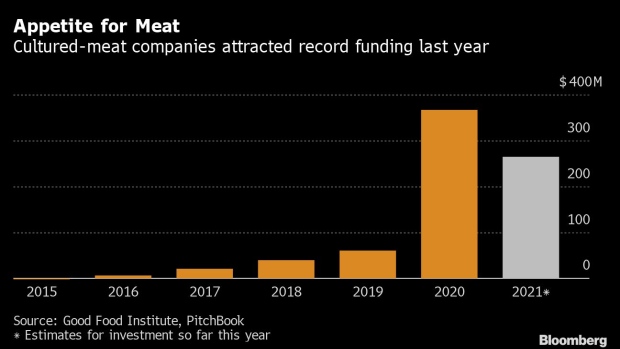Jun 23, 2021
Meat Grown in Israeli Bioreactors Is Coming to American Diners
, Bloomberg News

(Bloomberg) -- An Israeli startup wants to replace chicken coops, barns and slaughterhouses with bioreactors to churn out cell-based meat for American diners.
Future Meat Technologies Ltd. is in talks with U.S. regulators to start offering its products in restaurants by the end of next year. The company has just opened what it calls the world’s first industrial cellular meat facility, which will be able to produce 500 kilograms (1,102 pounds) a day.
“From the get-go, our main focus was around scaling up and reducing cost in order to have a commercially viable product,” Chief Executive Officer Rom Kshuk said in an interview.
The cultured meat industry, which produces proteins like beef and chicken by growing cells instead of slaughtering animals, now spans more than 75 companies. As pilot plants take the technology out of the lab, Eat Just Inc. became the first company to sell cell-grown chicken in a restaurant in Singapore.
Since the first prototypes, startups have cut costs by 99% and if consumers take to these products, the market could reach $25 billion by 2030, McKinsey & Co. said in a report last week. But to compete with conventional meat, costs need to be slashed even further.
Future Meat Technologies, which has raised $43 million from investors including Tyson Foods Inc., Archer-Daniels-Midland Co. and S2G Ventures LLC, claims the lowest price for cultured chicken breast. It’s managed to cut the cost to $4 per 100 grams, a fraction of the original price, and plans to cut it by half again by the end of 2022, Kshuk said.
The company’s facility, located in the Israeli city of Rehovot, can produce cultured chicken, pork, and lamb, with the production of beef coming soon.
Still, it’s small compared with some conventional farm factories, some of which slaughter thousands of animals per day. The Good Food Institute said cultured meat production will need to reach millions of tons a year to progress from the demonstration to the industrial stage.
Future Meat will be able to “scale out” production lines and replicate the facility elsewhere, Kshuk said. It plans to target the U.S. market -- which has some of the biggest meat consumption rates in the world -- before expanding to Europe and China. The company has yet to decide what type of meat to start offering first.
Other companies, including BlueNalu Inc., Upside Foods Inc. and Eat Just, have expressed an intention to sell cell-based products in the U.S. Like them, Future Meat must get approval from the U.S. Department of Agriculture and the Food and Drug Administration before offering its products to the public. Kshuk is optimistic, though reaching price parity with conventional meat will probably take the nascent industry a few years.
“We are aiming to reduce the cost more, more and more,” the CEO said. “The story here is not to have a premium product. This is really about finding an alternative way to produce meat.”
©2021 Bloomberg L.P.





